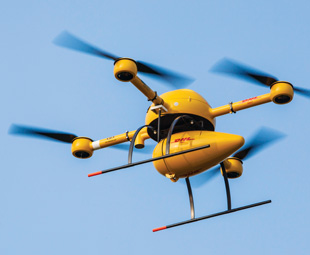More efficient with better technology

Supply chain management is changing faster than ever before! What does the future hold? MARISKA MORRIS asks PricewaterhouseCoopers’s global leader of transport and logistics, Stefan Stroh, and head of transport and logistics for Africa, Andrew Shaw, to take a peek at their crystal balls
The transport and logistics sector is changing rapidly. Both Stroh and Shaw believe there are five big changes taking place. The first of these is a change in the demands of customers.
Customers now want to order and receive products on the same day, which is eroding the difference between business-to-consumer and business-to-business models. “Customers are used to specific service levels in their personal lives and they expect the same kind of delivery in business-to-business transactions,” Stroh explains.
He doesn’t believe the industry is prepared for this change. Stroh mentions the Adidas factory in Germany that is changing its manufacturing method – it now has a store where customers can design their own shoes. The specs are sent to the factory and the shoes are produced within one and a half hours and delivered to the customer’s house on the same day.
There are also significant technological developments taking place in the supply chain management industry. Shaw says: “We’ve seen a significant amount of automation of robotics moving into that space. From fully automated warehouses to self-driving cars, utilising technology is increasingly important for logistics to remain competitive and efficient.”
Stroh adds: “Even more importantly, I think that there is a huge push towards self-driving trucks. You will probably see these in the next three years.”
When asked when South Africa will see self-driving trucks on the roads, Shaw explains that it comes down to economics.
“In Europe, there is a big drive for it to happen quite quickly, because there is a shortage of truck drivers. In South Africa, the economics are different. You will probably find that it is still considerably cheaper to continue to use normal trucks with a driver,” he says. “South Africa will probably be a late adopter, because it will take some time for the economics to favour the change.”
Shaw notes that in South Africa technological changes are taking place more on the digital platform. New platforms are being developed that offer more data and improved transparency. The logistics industry is also considering innovations to improve its inventory handling and warehousing.
“This is the area of technology that companies have embraced more quickly − mainly because they often have to service quite complex sectors with relatively small amounts of inventory compared to some of the big global companies,” Shaw explains.
There has also been a continuing growth in e-commerce. “We identified a 30-percent growth in e-commerce in the past year in South Africa,” Shaw says. He explains that this is driving a new business model where logistics is key. “The ability to get a product to somebody’s door very quickly is actually our competitive advantage,” he says.
Drones are another important innovation. They are used in warehouses and recently Amazon launched a pilot project using drones in last-mile delivery. Shaw believes that the use of drones for deliveries might not be feasible, as a driver, who can deliver 20 parcels in an hour, will most likely be more effective than a drone that can only carry two or three kilograms.
The technology is available. “The question is simply, does it make economic sense?” Stroh asks. Instead of Amazon’s last-mile delivery drone, Stroh believes drones are more efficient when used for surveillance, or for delivery in hard-to-reach places. He gives the example of the German delivery firm DHL.
The company uses a “parcelcopter” to deliver pharmaceuticals and other goods to the North Sea, which is 12 km from the coast of Germany. There might be a market for this type of application in Africa. “I suppose there is a great opportunity in Africa to use drones where road transport is difficult, due to poor infrastructure,” Shaw comments.
Drone technology might make Africa more appealing to South African logistics companies. Like South Africa, many countries in Africa have a reduced growth forecast. Local logistics companies are looking to other markets to achieve a greater return.
“Service delivery in Africa is difficult; the distances are long, the infrastructure is challenging and border posts can be unreliable and often do not provide required service,” Shaw says.
The transport and logistics sector is also in flux. Stroh notes: “We see a continuous process of consolidation in this industry. Other industries have top players that command half or more of the industry. In trucking, 15 percent is commanded by the top five players worldwide. There is a huge fragmentation in the industry.”
“Logistics companies will soon have no other choice but to consolidate. Otherwise, they will not be able to invest in the automation and the technology deployments that will be required in the future,” says Stroh. “The market has also changed with customers becoming competitors by in-sourcing logistics functions.”
There are also new competitors emerging. “We see a huge advancement of pure tech companies that go to the logistics market by taking specific elements of the logistics value chain and disrupting them with technology,” says Stroh, who adds that these companies are often more efficient than existing ones.
In order to stay ahead of the new developments, Stroh believes two main changes will happen within logistics companies. They will look into managing their portfolios and strive for operational excellence.
“It has been a very opportunistic business. In the future, these companies will make much more educated choices about which markets to support and in which sectors they want to do business,” he says.
All this will make little difference, however, if companies aren’t efficient. “If you want to compete in that market you have to be operationally excellent,” Stroh comments, “You can digitise as much as you want to, but if you are not operationally excellent, it won’t make a difference.”
Published by
Focus on Transport
focusmagsa




